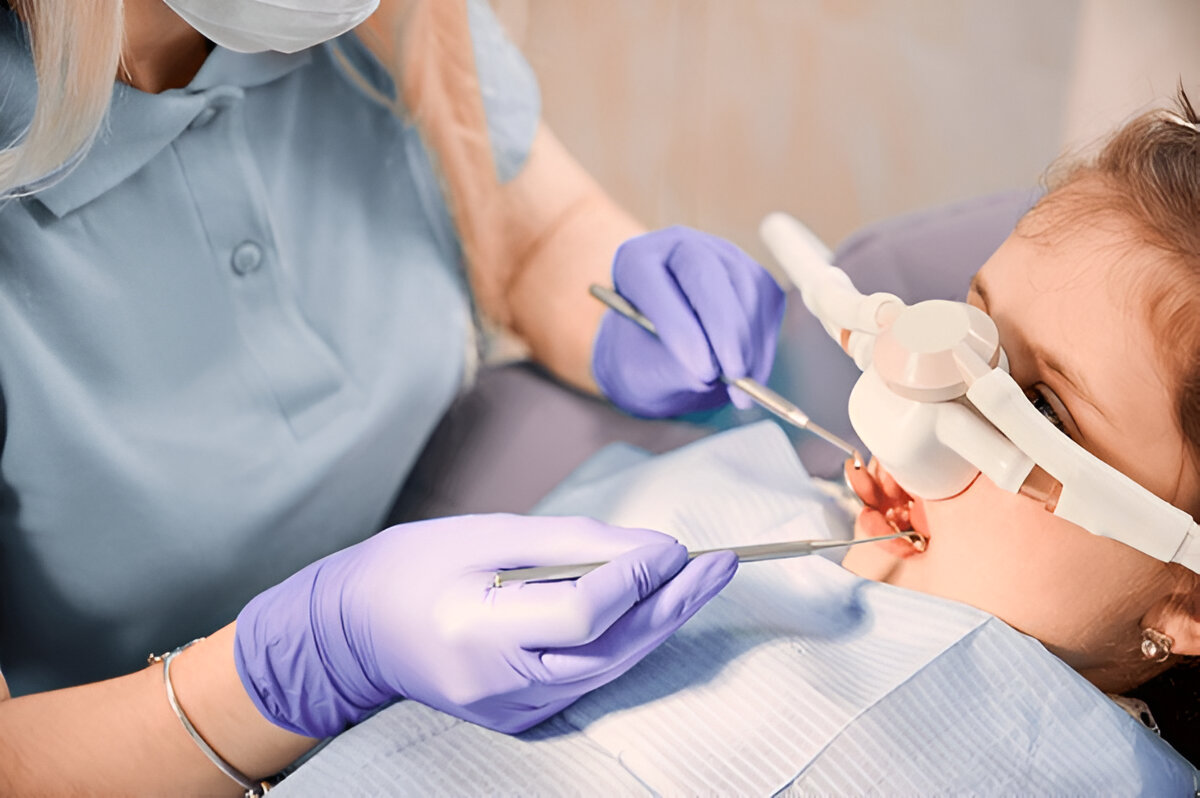For some, the mere thought of going to the dentist evokes anxiety, fear, or even panic. If you are afraid of dentist but require treatment, take comfort in knowing that you are not alone. Dental fear is a genuine and widespread problem for both children and adults. The good news is that dental sedation has never been more convenient for undergoing necessary dental care without fear or pain.
This in-depth guide delves into how sedation dentistry close to you in Glasgow can change your experience if you scared of dentist but need treatment, making you receive the care you require with ease and confidence.
Understanding Dental Fear: Why Individuals Fear the Dentist
Individuals fear dental care for reasons that are as diverse as they are unique. Some of the most common include:
- Fear of pain
- Dentist embarrassment about oral health
- History of a traumatic dental experience
- Needle phobia
- Sense of helplessness
Most individuals who are afraid of visiting the dentist due to poor teeth fear that their problem will be criticized, or that the procedure will hurt. Such a fear may lead them to avoid seeking medical attention, which serves to deteriorate their dental health and calls for further complex procedures.
What is Sedation Dentistry?
Sedation dentistry is the use of medication to make patients relax when undergoing dental treatment. It works best for anxious dentist patients who would rather not go for dental treatment because they are afraid or anxious.
There are various levels of sedation:
- Minimal sedation – the patient remains awake but relaxed.
- Moderate sedation (conscious sedation) – the patient is awake but might not remember much of what happened during the procedure.
- Deep sedation – the patient is on the threshold of consciousness but can be easily woken.
- General anesthesia – the patient is fully unconscious.
In the majority of Glasgow dental clinics, dental sedation is typically provided as IV sedation (intravenous sedation) or oral sedation (tablets).
Forms of Sedation Dentistry Services in Glasgow
Two major forms of sedation provided by dental clinics such as Dental Scotland for anxious dentist patients are:
1. Oral Sedation
This involves taking a sedative pill about an hour before the procedure. It makes you feel sleepy and calm but still awake. It’s ideal for patients with mild to moderate anxiety.
2. IV Sedation (Intravenous Conscious Sedation)
This type of sedation is injected directly into your blood. You are very relaxed and will have little or no memory of the treatment. IV sedation is ideal for more complicated treatments or for people who are afraid to visit the dentist due to poor teeth.
Both methods are safe when carried out by a trained and qualified dental practitioner. At Dental Scotland, sedation treatments are carried out by experienced practitioners who consider your complete medical history.
Advantages of Sedation Dentistry
If you’re afraid of dentists but require treatment, sedation has numerous benefits:
- Reduces fear: You’ll feel relaxed and calm throughout the procedure.
- Pain-free procedure: Sedation is combined with local anesthetic for a pain-free treatment.
- Control of gag reflex: Sedation may suppress an excessive gag reflex.
- Effective treatment: More can be done in less time.
- Amnesia effect: Most patients don’t remember the treatment, preventing subsequent apprehension.
Who is a Good Candidate for Sedation Dentistry?
Sedation dentistry is appropriate for:
- Individuals suffering from extreme dental fear
- Individuals who are apprehensive dentist patients with general apprehension
- Sensitive gag reflex patients
- Individuals for prolonged or intricate procedures
- People who have trouble staying still in the dental chair
If you’re afraid to visit the dentist due to poor teeth, sedation dentistry is a safe and efficient method that makes treatment possible.
Safety Considerations and Side Effects
Dental sedation is very safe when performed by qualified professionals. Still, one must keep in mind certain safety considerations:
- Medical history: Tell your dentist about any current medical conditions, allergies, or medications.
- Post-sedation care: You’ll require someone to drive you home from sedation. You’ll need to rest for the rest of the day and not drive or use machinery.
- Mild side effects: These could be drowsiness, dry mouth, or mild amnesia, which usually go away within hours.
What to Expect When You Visit a Dentist for Sedation Dentistry
When you opt for sedation dentistry in Glasgow area near you, here’s what your typical visit will be like:
- First consultation: Your medical history will be discussed with you, and the most appropriate form of sedation will be selected.
- Pre-treatment instructions: You may need to fast, depending on the type of sedation.
- Procedure day: You receive sedation, which is followed by local anesthetic. The treatment is carried out while you feel at ease and relaxed.
- Post-treatment: You’ll be recovered in the clinic until the sedation has fully gone from your system. Someone will need to take you home.
Common Treatments Performed Under Sedation
Most dental work can be done under sedation, such as:
- Tooth removal (wisdom teeth, etc.)
- Root canal
- Dental implants
- Fillings
- Deep cleaning and scaling
- Cosmetic dentistry (veneers, crowns, whitening)
Scared-of-the-dentist patients who need treatment feel more in control when they find out sedation is even an option for routine care.
Real Stories: How Sedation Helped Nervous Patients

Most patients describe feeling totally relaxed and surprised at how easy the procedure was:
“I hadn’t been to the dentist for years because I was afraid to go to the dentist due to rotten teeth. The staff was friendly, the sedation was great, and I don’t recall much. Now I’m actually anticipating my check-ups!”
Breaking Dental Phobia: Tips Aside from Sedation
Although sedation is a strong means, other techniques can provide relief:
- Establish trust: Go to the clinic prior and get acquainted with the staff.
- Bring support: Have a friend or loved one accompany you.
- Use distractions: Music, noise-canceling headphones, or guided breathing can help.
- Ask questions: Understanding the process reduces fear.
- Take small steps: Start with a consultation before committing to treatment.
Cost of Sedation Dentistry in Glasgow
Dental sedation price varies according to the type administered and how complicated the treatment is. In Glasgow, the cost of sedation tends to begin at £500 and escalate based on length and method (oral vs IV).
The majority of private dental care, including cosmetic treatment, provides sedation as an add-on service. Don’t forget to request a cost breakdown when consulting for the first time.
Recognizing people who are Scared of dentist but need treatment : Sedation Dentistry in Your Area in Glasgow
When you’re anxious about the dentist but require treatment, it becomes particularly crucial that you choose the proper dental clinic. The good news is that numerous dental surgeries throughout Glasgow now incorporate sedation services, custom-made to make anxious dentist patients feel relaxed and safe. But how do you know which one to choose?
Below are four critical factors to keep in mind when looking for the best sedation dentistry close to you in Glasgow:
1. Qualified Sedation-Certified Dentists
One of the critical things to verify is whether the dentist delivering the sedation is qualified and certified in sedation methods like IV (intravenous) or oral sedation. Sedation dentistry is an extremely specialized procedure that doesn’t just calm patients, but does so in a medically safe and controlled setting. Clinics such as Dental Scotland go to great lengths to make sure that their sedation treatments are performed by professionals who have specialized in additional qualifications within conscious sedation, for optimum safety and reassurance.
2. Positive Patient Reviews
Take the time to read patient reviews and testimonials online before choosing a clinic. Search for patient feedback who were afraid to visit the dentist due to rotten teeth or were anxious about dentistry. Favorable feedback specifically stating a peaceful ambiance, caring personnel, and successful sedation experience are a good reflection of the quality and trustworthiness of the clinic. Other people’s real-life testimonials can give you more confidence and make you believe that you’re making the best decision.
3. Clear Pricing and Unambiguous Treatment Plans
Cost is frequently a factor, particularly if you are looking into private care or higher-end treatments. A reputable clinic will give you a clear, up-front breakdown of the costs for all dental sedation. The dentist should also include a written treatment plan as part of your first visit consultation, including procedures, method of sedation, recovery, and overall cost. This transparency avoids surprises and enables you to budget in advance with confidence.
4. A Supportive, Patient-Centered Environment
For anxious dentist patients, the general atmosphere of the dental clinic is a huge factor in alleviating anxiety. Find clinics that provide a friendly ambiance, listen carefully to your concerns, and thoroughly explain procedures. Soft-spoken communication, judgment-free personnel, and accommodating appointment schedules are important indicators of a clinic dedicated to patient-centered care.
Identifying the appropriate sedation dentistry close to you in Glasgow can change your dental experience from a fear-based one to one that is comfortable and trusting.
Conclusion: Get the Care You Deserve with Confidence
If you’re afraid of the dentist but require treatment, you need not endure silently. Sedation dentistry provides access to high-quality care without anxiety or pain. From regular check-ups to complete smile makeovers, the right dental care team can assist you along the way.
Dental Scotland provides a broad scope of services for both private and NHS patients—such as general check-ups, cosmetic dentistry, facial aesthetics, emergency treatment, and dental sedation, of course. Their caring and highly trained staff see that even the most anxious dentist patients are made to feel secure and at ease.
By selecting a provider such as Dental Scotland and embracing the advantages of sedation dentistry in your area of Glasgow, you’re not only investing in your oral health—but your sanity.



















